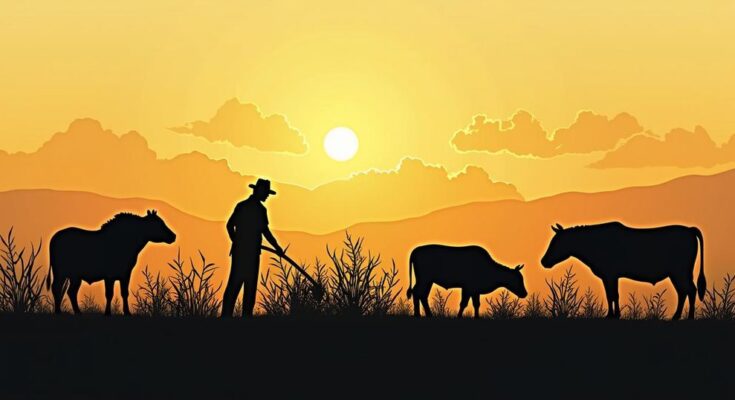Columbia University and the IICA have initiated a partnership to create a new narrative around agriculture’s value in Latin America, focusing on food security, environmental sustainability, and energy security. A panel of experts from various sectors convened to discuss strategies for enhancing agri-food systems amidst global challenges. This discourse aims to elevate agriculture’s role as a critical provider of solutions in light of population growth and climate crises, with plans to showcase agricultural realities at COP 29 in November.
Columbia University and the Inter-American Institute for Cooperation on Agriculture (IICA) have embarked on a collaborative initiative aimed at crafting a new narrative that underscores the essential value of agriculture in Latin America. This initiative is particularly salient in light of the pressing global challenges projected for the next three decades. A select cadre of experts from diverse sectors, including public, private, and academia, convened at a symposium in New York to delineate a strategic roadmap that addresses critical issues such as food security, environmental sustainability, and energy security. The overarching objective of this initiative is to bolster the agri-food systems within the region, positioning them as pivotal players in a global landscape characterized by exponential population growth, political conflicts, and climate crises. This symposium took place at Columbia University’s Forum, a distinguished venue known for its influential role in shaping international discourse. Significant figures attended the event, including President of the Cooperative Republic of Guyana, Mohammed Irfaan Ali; Manuel Otero, Director General of IICA; Jeffrey Shaman, Interim Dean of Columbia’s Climate School; and Cynthia Rosenzweig, Senior Research Scientist at NASA’s Goddard Institute for Space Studies, among others, all of whom contributed valuable insights to the discussion. Izabella Teixeira, former Minister of the Environment in Brazil and current Special Advisor to IICA for the G20 and COP 29 and 30, presided over the discussions. This collaborative effort draws attention to the critical role Latin America plays as a global provider of food and ecosystem services, leveraging its vast natural resources and the potential for innovative technological advancements. The interactions among agriculture, climate change, and biodiversity loss necessitate a fresh narrative that advocates for more sustainable resource management, reduction of greenhouse gas emissions, enhanced resilience, and increased agricultural productivity. The session titled “Creating a new narrative for agriculture in Latin America. Resource-efficient agri-food systems for the health of people and the planet” was coordinated to align with the United Nations General Assembly and Climate Week in New York. In the course of the discussions, participants outlined preliminary frameworks for a document that reflects the partnership between Columbia University and IICA. This document aims to illuminate the true contributions of regional agriculture to food security, environmental sustainability, and global social stability. President Irfaan Ali stressed the necessity of evolving beyond traditional notions of agriculture by highlighting the intrinsic relationship between productivity and biodiversity conservation. Furthermore, Manuel Otero echoed this sentiment, pointing out the persistence of an outdated narrative that fails to accurately portray rural realities in Latin America. He remarked, “an outdated narrative still survives that does not reflect the reality of rural areas in Latin America and is characterized by depicting a commodity-based, extractive, and very primary agriculture, where quantity is more important than quality.” The formulation of this new narrative intends to erect synergies amongst government entities, industry stakeholders, and civil society within key global forums focused on political and environmental dialogues. A vital milestone in this process will occur during the upcoming United Nations Climate Change Conference (COP 29) in Azerbaijan, where IICA plans to establish a pavilion highlighting the conditions of agriculture in the Americas. Another significant moment will arise next year at COP 30, to be hosted by Brazil. Teixeira emphasized the twofold challenge posed by ongoing climate and environmental crises. She asserted the need for a dialogue that transcends the dichotomy between agricultural production and environmental stewardship, thereby reaffirming the indispensable role of Latin American agriculture amidst international instability and evolving trade norms. Columbia University researcher Walter Baethgen articulated the difficulty of the endeavor, questioning public awareness regarding agriculture’s significance, particularly within urban demographics. He stated, “When we build a new narrative, the question is, who are we talking to?” The consensus among participants underscored the imperative role of scientific innovation and advancement in meeting the evolving demands for healthy food amidst shifting consumer behaviors. Furthermore, critical issues such as health, emerging dietary trends, and the influence of climate migration and associated armed conflicts were identified as essential components meriting attention in this new narrative.
The initiative taken by Columbia University and IICA highlights the strategic importance of agriculture in addressing global challenges anticipated over the coming three decades. With the interplay of growing populations, political instability, and climate crises, it becomes imperative to develop a narrative that aligns agricultural practices with sustainability goals. The gathering of experts, including government officials, research scientists, and industry leaders, facilitates a multidisciplinary approach to understanding the complex interactions between agriculture, biodiversity, and climate change. The discussion points towards reimagining agricultural narratives to foster a holistic view that enhances food security while maintaining environmental integrity and societal well-being.
In conclusion, the collaborative effort between Columbia University and the IICA represents a significant stride toward redefining agricultural narratives in Latin America. By addressing critical intersections of agriculture, sustainability, and public policy, this initiative aims to foster a more informed dialogue that promotes efficient resource utilization and cultivates resilience in the face of global challenges. As discussions progress towards distinctive frameworks and actionable roadmaps, the emphasis on collaborative engagement with diverse stakeholders ensures that agriculture can effectively contribute to both food security and environmental sustainability in the years to come.
Original Source: caribbeannewsservice.com




